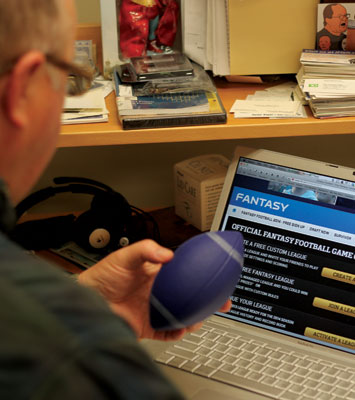The fantasy sports phenomenon
Think you have what it takes to build your own team?
Amanda Ducheminsky
Sports Editor
According to the Fantasy Sports Trade Association (FTSA), in 2014 there were 41 million Canadians and Americans, age 12 and over, playing fantasy sports. American football is the most active fantasy league in the U.S. and Canada before baseball and hockey, states the FTSA. What is this growing phenomenon and why is it so popular?
What is fantasy football?

Is this the real life? Is this just fantasy (football)? In fantasy sports you can build your own dream team online.
Photo illustration: Albina Khouzina
Fantasy football is an interactive “game” where players compete against friends, co-workers or strangers using real life football player statistics. Competitors act as virtual general managers, picking their own fantasy teams.
Picks are made by drafting, adding, trading or dropping player names onto a fictional team roster. The roster has specific categories that must be filled. For example, the Canadian Football League (CFL) fantasy football weekly roster includes one quarterback, one running back, two receivers, one flex spot (either a running back or receiver), one kicker and one defense/special teams player.
Points are awarded based on the performance of the players picked. Performance is based on game statistics such as yards run or completed passes made. For example, a picked quarterback is awarded four points if they score a touchdown in that week’s game. The winner of fantasy football has the most points overall, based on football players’ performances, at the end of the season.
Other factors, such as weather and injuries must also be accounted for when making picks. Specifics on points, timing and budget vary depending on the fantasy tournament.
Why are fantasy sports so popular?
Fourth-year Mount Royal University criminal justice major, Kevin Pedersen, has taken part in fantasy football for five years. He’s tried out both the ESPN and National Football League (NFL) websites. Pedersen started playing to compete with friends and fellow fans. “I got started because I really enjoyed watching football. It was an opportunity to learn more about players and have fun competing with friends and other football fans.”
He enjoys the football learning curve that fantasy football provides. “You begin to root for specific players and begin to enjoy watching specific teams based on fantasy performance. Since you are following individuals, it really makes you diversify the teams that you follow and not limit you to one or two.”
Fantasy football makes Pedersen feel more connected to the league. “It also allows you to follow football more closely and feel like you have a connection with the players and teams that are on your fantasy team,” he said.
The trend has increased in popularity since player stats have become readily available online. Mobile apps and increased live coverage have made it that much easier to follow players and keep up-to-date with team progress. According to the FTSA, the average person spends three hours a week managing their fantasy team.
Pedersen says one negative of playing fantasy football is the time factor.
Virtually all major sporting sites offer fans the ability to join a league. Competitors can compete for free and for bragging rights or with real money. Depending on the league, winners can enter for prize packages. The CFL started up its own online fantasy league in 2004. Brent Scrimshaw, former CFL chief marketing officer, made a statement after the CFL decided to continue on its fantasy league, after its first year of success. He explained that fantasy football “not only allows us to grow the connection between CFL fans and our game, but it also provides the perfect medium for die-hard CFL fans to better connect and compete with each other.”
 Texas University researchers, Seunghwan Lee, Won Jae Seo and Christine Green, identified 13 motives behind fantasy sport participation including game interest, becoming a general manager/head coach, love for the sport, prize, competition, entertainment value, bonding with friends/family, social interaction with other participants, knowledge application, hedonic (up-and-down) experience, escape and substitute for a losing team and gambling.
Texas University researchers, Seunghwan Lee, Won Jae Seo and Christine Green, identified 13 motives behind fantasy sport participation including game interest, becoming a general manager/head coach, love for the sport, prize, competition, entertainment value, bonding with friends/family, social interaction with other participants, knowledge application, hedonic (up-and-down) experience, escape and substitute for a losing team and gambling.
Mathew Cauz, TSN 1050 radio host and CFL writer, started a “Cauz vs. Canada” fantasy pick in 2013. He started the competition because he wanted to be able to poke fun at his rivals on social media and learn more about some of the ‘obscure’ players in the CFL. He wrote, “It increases your knowledge of the game, it forces you to be more invested in the sport and it gives you an excuse to watch the fourth quarter of a horrible blowout game.”
It’s not too late in the CFL or NFL season to join a fantasy league. Learn more about the game you love and pick your players today.




